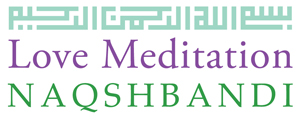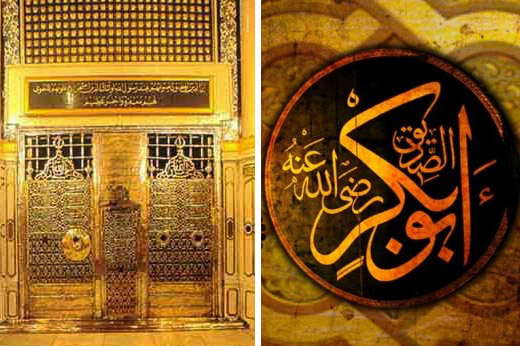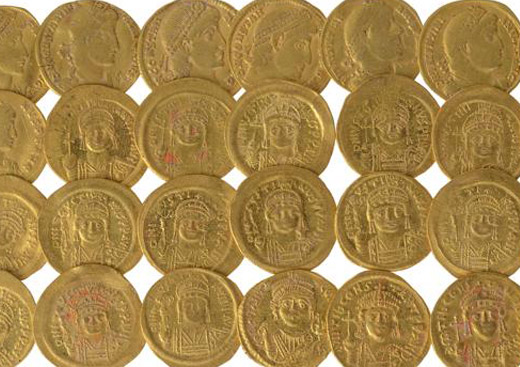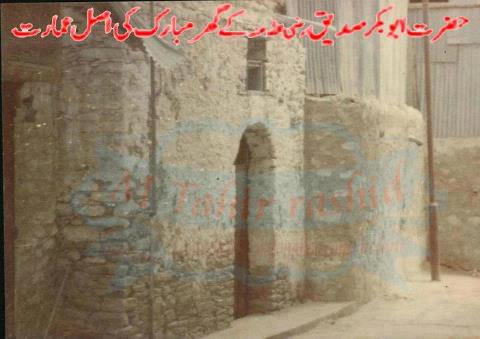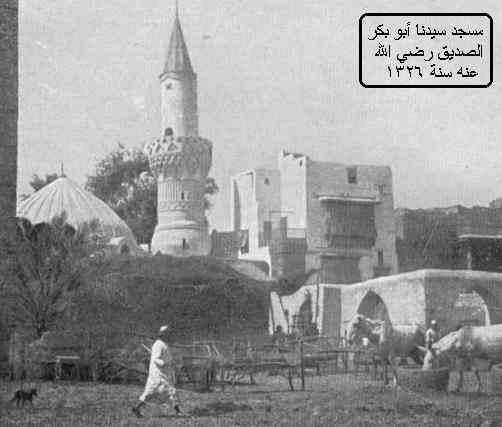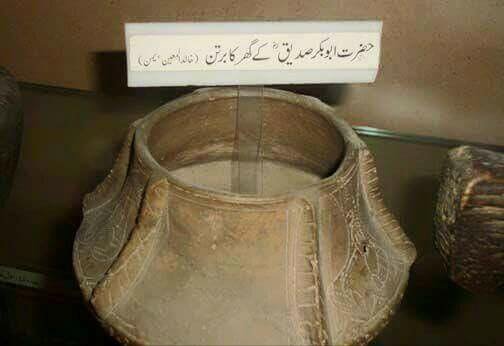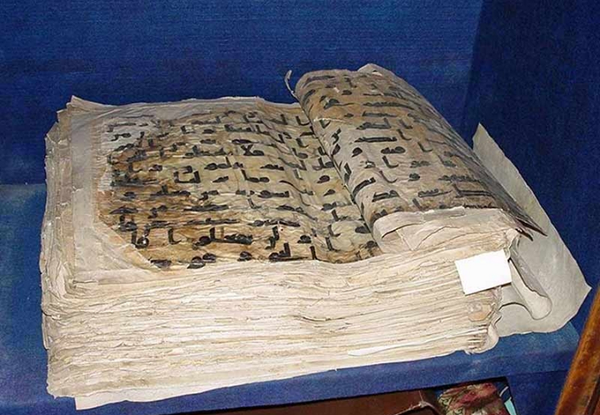Sayyidina Abu Bakr as-Siddiq RA – URS 22nd Jumada al-Thani
Sayyidina Abu Bakr as-Siddiq RA – URS 22nd Jumada al-Thani (Friday 22 Feb 2019)
Sayyidina Abu Bakr as-Siddiq RA – URS 22nd Jumada al-Thani 13 AH (23rd August 634 AD)
The Secret was transmitted and flowed from the Master of all Nations, the Messenger of Allah ![]() to the first Khalif, Imam of Imams, Sayydina Abu Bakr as-Siddiq
to the first Khalif, Imam of Imams, Sayydina Abu Bakr as-Siddiq ![]() . Through him the religion, Faith was supported and the Truth protected. Allah mentions and praises him in His Holy Quran in many verses:
. Through him the religion, Faith was supported and the Truth protected. Allah mentions and praises him in His Holy Quran in many verses:
“As for him who gives and keeps his duty, we facilitate for him the way to ease.” [Al-Lail: 5-7] and
“And (away from the fire) shall be kept the most faithful who gives his wealth, thereby purifying himself,and seeks to gain no pleasure or reward other than the Presence of his Lord, the Most High.” [Al-Lail:17-21]
Ibn al-Jawzi states that all Muslim scholars and the Companions were certain that these Ayats referred to Sayydina Abu Bakr as-Siddiq RA. Among all the people he was called “Al-Atiq,” the most pious, delivered from the punishments of the fire.
When Ayat 56 of Surah Al-Ahzab revealed that “Allah and his angels bless the Holy Prophet, SalAllahu alayhi wa Sallim,”Sayydina Abu Bakr as-Siddiq RA asked if he also was included in this blessing. Ayat 43 was then revealed stating:
“He it is who sends His blessing on you and so do His angels, that He may bring you forth out of darkness into light. And He is merciful to the believers.” [Al-Ahzab: 43]
Ibn Abi Hatim explained that Ayat 46 of Surah Ar-Rahman came in reference to Sayydina Abu Bakr as-Siddiq RA:
“And for him who fears to stand before his Lord there are two gardens.” [Ar-Rahman:46] and:
“We have enjoined on man kindness to his parents: in pain did his mother bear him, and in pain did she give him birth. The carrying of the (child) to his weaning is thirty months. At length, when he reaches the age of full strength and attains forty years, he says, “O my Lord! Grant me that I may be grateful for Thy favour which Thou hast bestowed upon me, and upon both my parents, and that I may work righteousness such as Thou mayest approve; and be gracious to me in my issue. Truly have I turned to Thee and truly do I bow (to Thee) in submission.” Such are they from whom We shall accept the best of their deeds and pass by their ill deeds: (they shall be) among the Companions of the Garden: a promise of truth, which was made to them (in this life).” [Al-Ahqaf: 15-16]
Ibn Abbas RA says that these Ayats came as a description of Sayydina Abu Bakr as-Siddiq RA, Allah honouring and elevating his state among all the Companions of the Prophet ![]() . Ibn `Abbas R notes further that Ayat 158 of Surah Al-Imran was revealed in reference to Sayydina Abu Bakr as-Siddiq RA and Sayyidina Umar
. Ibn `Abbas R notes further that Ayat 158 of Surah Al-Imran was revealed in reference to Sayydina Abu Bakr as-Siddiq RA and Sayyidina Umar ![]() :
:
“And take council with them on important matters.” [Al-Imran: 158]
Finally, the great honour accorded to Sayydina Abu Bakr as-Siddiq RA in accompanying the Holy Prophet ![]() on his flight from Makkah to Madinah, is referred to in the ayat:
on his flight from Makkah to Madinah, is referred to in the ayat:
“When the unbelievers drove him out, he had no more than one companion. The two were in the Cave, and he said to his companion, Fear not, for Allah is with us.” [At-Tawbah: 40]
GrandSheikh of Naqshbandi Golden Chain Tariqah (talk April 1999 Sheikh Nazim al-Haqqani ar-Rabbani (KS)
Allah Almighty asked the Holy Prophet Prophet sallallahu alaihi wa sallam – peace be upon him – to be with Him, and the Prophet asked the Sahaba/Companions (RA) to be with him. To be ‘with him’ meant for them to be as he wished them to be; the Shaykh also asks mureeds to be ‘with him’.
The Prophet (SWS) was saying about Sayyidina Abu Bakr as-Siddiq RA, may Allah be well pleased with him, that he was someone who had ‘died before he died’ because he had absolutely left all his desires behind, so that there was nothing left of them in the face of his Lord and his Prophet, SalAllahu alayhi wa Sallim; he was a dead person with no desire for this life. When he had arrived at this state, he was like a shadow of the Prophet, SalAllahu alayhi wa Sallim, entirely in agreement with him, never leaving his way!
Because of this attribute, Sayyidina Abu Bakr as-Siddiq RA became trustworthy in all respects, and thus the Prophet, SalAllahu alayhi wa Sallim, was able to plant many knowledges in his heart; therefore in spiritual rank, Sayyidina Abu Bakr as-Siddiq RA was at the top of all companions of the Prophet, SalAllahu alayhi wa Sallim.
The Prophet, SalAllahu alayhi wa Sallim, praised him saying that if his faith was balanced against the faith of the whole Ummah/nation of Muhammad, SalAllahu alayhi wa Sallim, his faith would be heavier.
On the Day of Promises, when everyone was asked by Allah Almighty “Am I not your Lord?” and we replied “Yes, You are our Lord” on that day, if it had not been for Sayyidina Abu Bakr as-Siddiq RA teaching everyone with his spiritual power, no one could have said ‘Yes’.
Our Grandshaykh, may Allah bless him further grant him secrets, said that everyone has a share of Sayyidina Abu Bakr as-Siddiq RA’s faith, even the person of the lowest degree of faith; from that share, whether they pray or not, so many people will go to Paradise because it keeps people from a bad ending in this life and the next. “La ilaha ill-L’lah, Muhammad Rasulullah” is written in the heart, it only needs a chance to show itself. so many people have the seeds of faith in their hearts, deeply planted, only waiting for mercy rain; mercy may be delayed up to the end: A person may be on his deathbed and begin to cry. This crying attracts that mercy, Allah Almighty says: “My servant is crying” and the seed of faith opens, filling the heart, green with the Lights of real faith. He was like a desert, then death comes, and he begins to cry; that is the sign of mercy coming on him. Allah does not leave His servants; He has Endless Mercy! The Prophet, SalAllahu alayhi wa Sallim, said about Sayyidina Abu Bakr as-Siddiq RA: “Whatever Allah has put in my heart I have poured into the heart of Sayyidina Abu Bakr as-Siddiq RA.”
Sayyidina Ali radiyallahu `anh also put his will and desires totally in line with the Prophet’s, SalAllahu alayhi wa Sallim, desires; therefore the Holy Prophet, SalAllahu alayhi wa Sallim, said about him: “I am the City of Knowledge, and Ali is the gate to that City.”
There are 41 Tariqats/Orders to make our hearts pure; 40 springs from the heart of Imam Ali (RA), and one, the Naqshbandi Order is coming from Sayyidina Abu Bakr as-Siddiq RA. The Prophet had 124,000 companions and Sayydina Abu Bakr as-Siddiq RA was the grand companion. This is well known among real Tariqat Sheikhs who don’t give titles to themselves; they respect the Naqshibandi Order as the first one.
In addition to the praise of Allah, Sayyidina Abu Bakr as-Siddiq RA received the praise of the Holy Prophet  and of his companions. This is recorded in many well known Hadiths.
and of his companions. This is recorded in many well known Hadiths.
“ There is no one to whom I am obligated and have not repaid my debt except for Abu Bakr (RA), for I owe him much for which Allah will compensate him on the Day of Judgment.” – Holy Prophet Muhammad, SalAllahu alayhi wa Sallim,
“Whatever Allah poured into my heart, I poured into the heart of Abu Bakr (RA).” – Holy Prophet Muhammad, SalAllahu alayhi wa Sallim.
“Hazret Sayyidina Abu Bakr Siddiq (RA) does not precede you because of much prayer or fasting, but because of a secret that is in his heart.” – Holy Prophet Muhammad, SalAllahu alayhi wa Sallim.
“No wealth has ever benefited me as much as the wealth of Abu Bakr (RA).” – Holy Prophet Muhammad, SalAllahu alayhi wa Sallim.
“There is no one among the people who has been more generous to me with his life and his property than Abu Bakr ibn Abi Quhaafa and if I was to take a bosom friend, I would take Abu Bakr as my bosom friend. But, the friendship of Islam is better. Block off every door in this Masjid except the door of Abu Bakr.”
“When I invited people towards Allah, everybody thought over it and hesitated, at least for a while, except Abu Bakr (RA) who accepted my call the moment I put it before him, and he did not hesitate even for a moment.”
“Had I made anyone my friend except Allah, I would have chosen Abu Bakr (RA).”
“It is incumbent upon my Ummah to love Hazret Abu Bakr Siddiq (RA) and be thankful to him.”
Life before Islam
Abdullah was his name, although the name Ateeq was used more. Hazret Aisha (RA) further narrates ‘Once my father came to the Prophet and the Messenger of Allah said to him, “You are Allah’s freed one from the fire.” So he was known as Ateeq.
Since his boyhood, Sayyidina Abu Bakr as-Siddiq (RA) was a quiet and sincere man. He was very honest and truthful. Because of his sterling character he was the closest friend of the Holy Prophet (SWS) since his youth (even before Muhammad (SWS) proclaimed prophethood, and the friendship proved to be life-long. He was a soft hearted man and keenly felt others sufferings and miseries. He used to help the poor and the needy, the distressed and the downtrodden.
Even before embracing Islam he did not like most of the customs of the days of ignorance and never drank any liquor. His main profession was trade. He also accompanied the Holy Prophet (PBUH) in some of his trade missions. Because of his honesty people trusted him and often kept their money as a trust with him. His nobility and truthfulness soon made him a rich trader. Actually these qualities were soon to serve the noblest cause of Allah.
First Free Man to Accept Islam
Sayyidina Abu Bakr as-Siddiq (RA) was a firm friend of the Holy Prophet and knew him better than any other man. His honesty, nobility, truthfulness and trustworthiness, had great attraction for Abu Bakr (RA).
When the Holy Prophet (PBUH) disclosed to him secretly about the revelation of Allah, Abu Bakr (RA) accepted it immediately without having the slightest doubt. In this way he was the first adult free man to believe in the Holy Prophet’s Mission, and became his confidant.
Call towards Islam
As soon as he had accepted Islam he started the work of Da’wat (Invitation towards Allah) first secretly and then openly when it was so allowed by the Holy Prophet (RA). In the first instance eight prominent figures accepted Islam at the hands of Sayyidina Abu Bakr as-Siddiq (RA). Among them was Hazret Usman (RA), the third Caliph of Islam.
In this way he was the first Muslim, after the Holy Prophet ![]() , to preach Islam and to invite people towards Allah in a very fruitful way. The main reason for his success was his popularity among the Meccan’s because of his honesty, nobility, trustworthiness, good morals and fair dealings.
, to preach Islam and to invite people towards Allah in a very fruitful way. The main reason for his success was his popularity among the Meccan’s because of his honesty, nobility, trustworthiness, good morals and fair dealings.
Hardships for Da’wat (Invitation) towards Allah
One day in Makkah, Sayyidina Abu Bakr as-Siddiq (RA) asked the permission of the Holy Prophet (SWS) to invite people openly. On his persistent request the Holy Prophet (SWS) gave his consent and all of them went to Haram (the Holy Mosque or Kaaba) for preaching.
Sayyidina Abu Bakr as-Siddiq (RA) gave a Khutbah (Sermon) which was the first ever delivered in the annals of Islam. Hazret Hamzah (RA) accepted Islam the same day. When disbelievers and idolaters from amongst Quraish heard it they fell on the Muslims from all sides. Sayyidina Abu Bakr as-Siddiq (RA) despite the fact that he was considered to be the noblest of all the people in Mecca was besmeared with blood.
He was kicked, thrashed with shoes, trampled under feet and handled most roughly and savagely. He became unconscious. This is the place to observe his extreme love for the Holy Prophet (SWS) that when he gained consciousness and opened his eyes in the evening he first enquired. “How is the Prophet (SWS)?” His deep love and sincerity for the Holy Prophet (SWS) is the main cause of his success. His love and respect for the Holy Prophet (SWS) is unbounded.
On another occasion the Holy Prophet (SWS) was offering his Salat in the Kaaba, Abu Jahl came and put a sheet of cloth around his neck and twisted it hard in order to strangle the Holy Prophet (SWS) to death. Sayyidina Abu Bakr as-Siddiq (RA) saw this, he at once came and pushing Abu Jahl aside took off the piece of cloth around the neck of the Holy Prophet (SWS). He then said, “Do you want to kill such a gentle person who is a Messenger of Allah and declares Allah as the Cherisher and Sustainer.” Then Abu Jahl and other enemies of Islam fell upon Sayyidina Abu Bakr as-Siddiq (RA) and beat him severely.
Freeing of Slaves
Sayyidina Abu Bakr as-Siddiq (RA) served Islam in numerous ways. The Quraish cruelly persecuted a number of slaves who had accepted Islam and made life difficult for them. Muslim slaves were the worst sufferers at the hands of non-Muslim masters.
Hazret Bilal (RA) (an Abyssinian slave), one of the best known in the galaxy of Companions of the Holy Prophet (SWS), was one among such slaves. His master Umayyah bin Khalf lashed him at night and made him lie on the burning sand during the day because of Hazret Bilal’s (RA) conversion to Islam. His master was made angrier still as Hazret Bilal (RA) declared “Ahad, Ahad, Ahad,” even when tortured in the burning midday hot sun his cruel master placed a large rock on his chest asked him to renounce his faith but they could not break Hazret Bilal (RA) belief in Allah Almighty.
Sayyidina Muhammad (SWS) had learnt of Hazret Bilal’s (RA) cruel treatment and he asked Sayyidina Abu Bakr as-Siddiq (RA) to free him from his master at any cost. Sayyidina Abu Bakr as-Siddiq (RA) went to Umayyah bin Khalf and asked if he wanted to sell his slave. Umayyah bin Khalf sensing this would be an opportunity to gaining an upper hand in the sale refused at first and then shrewdly said he would sell Hazret Bilal (RA) for 10 gold coins. Sayyidina Abu Bakr as-Siddiq (RA) agreed at once and paid the amount, freeing Hazret Bilal (RA). Umayyah bin Khalf after laughed and Sayyidina Abu Bakr as-Siddiq (RA) asked him why he was laughing and Umayyah bin Khalf said “ If you had offered only 1 gold coin for my slave I would have sold him to you and now I have made the upper hand. ” Sayyidina Abu Bakr as-Siddiq (RA) answered promptly with conviction, “ Umayyah bin Khalf If you had asked for 100 gold coins to free Bilal (RA), Allah Almighty is my witness, I would have paid you without question! ”
Other Muslim slaves who were bought by Sayyidina Abu Bakr as-Siddiq (RA), and made free were, ‘Amir bin Fuhairah(RA), Nazirah(RA), Nahdiah(RA), Jariah(RA), Bani Momil (RA) and Bint Nahdiah (RA).
Sayyidina Abu Bakr (RA) gets title of As-Siddiq
The Holy Prophet (SWS) went on Mi’raj (Ascension) in the 10th year of his Holy Mission. He narrated his Ascension to the people in the morning. Some of them came to Sayyidina Abu Bakr as-Siddiq (RA) and said, “Have you listened to your friend (the Holy Prophet SWS)?
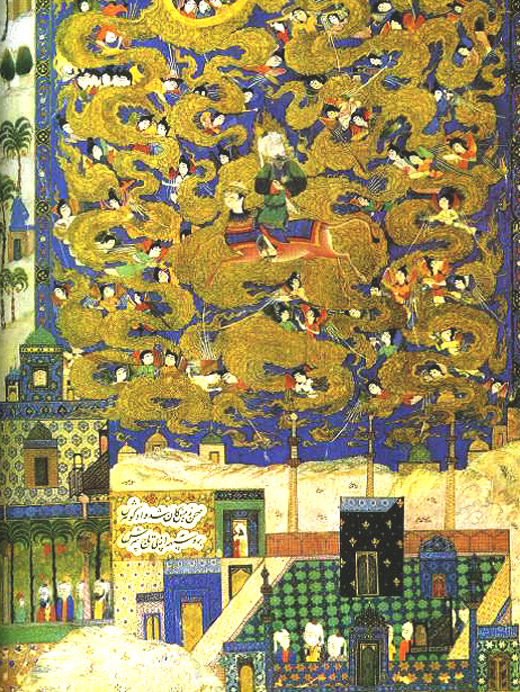
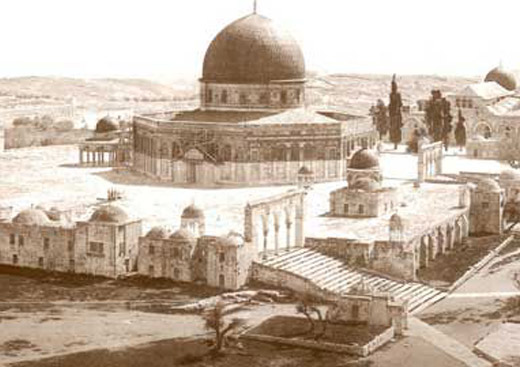
He is claiming that he visited Jerusalem and the Sublime Throne in the heavens last night and talked with Allah Almighty. “ Would you believe it? ” Sayyidina Abu Bakr as-Siddiq (RA) immediately replied. “If he said so then it is an absolute Truth”. They again said, “Do you believe that he visited all these places and came back within a small part of night?” He again replied.
“Of course I believe in it and I believe in the things which are farther than it, i.e., the news of Hell and Paradise”. For this the Holy Prophet (SWS) named him as-Siddiq i.e., the most Truthful and sincere person in Faith not having even slightest doubt.
“All those who obey Allah and the Prophet are in the company of those upon whom Allah has shown favours – of the Prophets, “Siddiqin” (The Sincere), “Shuhada” (The Martyrs), and “Salihin”(The Righteous Muslims): Ah! What a beautiful company.” (Holy Quran; Surah An-Nisaa 4:69).
Ashra Mubashara (Blessed Ten)
Sayyidina Abu Bakr as-Siddiq (RA) is one of the ten companions who were informed by the Holy Prophet (SWS) about the award of Paradise for them during their lifetime. This means these companions were chosen among 124,000 companions for this great blessing. But another amazing point about these ten is that six of them (besides him) reverted to Islam on the invitation of Sayyidina Abu Bakr as-Siddiq (RA) : Hazrat Usman(RA), Hazrat Talha(RA), Hazrat Zubair(RA), Hazrat Saad bin Abi Waqqas(RA), Hazrat Abdur-Rahman bin Auf (RA) and Hazrat Abu Ubaidah bin Jarrah (RA).
Virtues of Sayyidina Abu Bakr Siddiq (RA) mentioned by Companions of the Holy Prophet (SWS)
It was narrated that Ibn ‘Umar (may Allah be pleased with him) said: “We used to compare the people as to who was better at the time of the Messenger of Allah (peace and blessings of Allah be upon him). We used to regard Abu Bakr as the best, then ‘Umar ibn al-Khattab, then ‘Usman ibn ‘Affaan (may Allah be pleased with them).” Narrated by al-Bukhari, 3655.
According to another report he said: “At the time of the Prophet (peace and blessings of Allah be upon him) we did not regard anyone as equal with Abu Bakr(RA), then ‘Umar (RA), then Usman (RA), then we left the companions of the Prophet (peace and blessings of Allah be upon him) and we did not differentiate between them.” Sahih Al-Bukhari, 2679.
This is testimony of all the Sahabah (RA), narrated by ‘Abd-Allah ibn Umar (RA), that Sayyidina Abu Bakr as-Siddiq (RA) was superior to all the Sahabah, followed by Umar (RA), then Uthman (RA).
It was narrated that ‘Ali (may Allah be pleased with him) said: “No one is brought to me who regards me as superior to Abu Bakr (RA) and Umar (RA) but I will punish him with a beating like a fabricator.” Sheikh al-Islam Ibn Taymiyah said: It was narrated that he used to speak from the minbar of Kufa and say that the best of this Ummah after our Holy Prophet (SWS) was Abu Bakr (RA), then ‘Umar (RA). This was narrated from him via more than eighty Isnaads, and it was narrated by al-Bukhari and others.
It was narrated that Muhammad ibn al-Hanafiyyah (son of ‘Ali ibn Abi Talib RA) said: “I said to my father, ‘Which of the people was the best after the Messenger of Allah (peace and blessings of Allah be upon him)?’ He said, ‘Abu Bakr (RA).’ I said, ‘Then who?’ He said, ‘Then ‘Umar (RA).’ I was afraid that he would say Usman (RA). I said, ‘Then is it you?’ He said, ‘I am only one of the Muslims.’”
Sayyidina Abu Bakr as-Siddiq (RA) was the bravest of the companions. Hazret Ali (RA) said: “I saw the Messenger of Allah and the Quraish had grabbed him. One of the men held him and threw him down and was saying ‘Are you the one who have made all the gods into one god?’ By Allah, none of us approached except Abu Bakr (RA) who struck the men of the Quraish single-handed.”
Military Campaigns under Holy Prophet (SWS)
Although Sayyidina Abu Bakr as-Siddiq (RA) was a middle aged man and a merchant trader, he was the bravest and most fervent defender of the Holy Prophet (SWS). Sayyidina Abu Bakr as-Siddiq (RA) supported campaigns with his wealth and took part each battle, as directed by the Holy Prophet (SWS) as in the Battle of Badr (624 AD), Uhud (625 AD) as well as Battle of the Trench (627 AD). Sayyidina Abu Bakr as-Siddiq (RA) was also involved with expeditions of Amr ibn al-As (629 AD), Conquest of Mecca (630 AD), Battle of Hunayn (630 AD), Siege of Ta’if (630 AD)and Battle of Tabouk (630 AD).
Military Campaigns as Commander
Sayyidina Abu Bakr as-Siddiq (RA) also led one military campaign as commander, known as Expedition of Abu Bakr As-Siddiq, which took place in Nejd, in July 628 AD, 3rd Month 7 AH, of the Islamic Calendar Sayyidina Abu Bakr as-Siddiq (RA) led a large platoon in Nejd on the order of Prophet Muhammad, SalAllahu alayhi wa Sallim. Many were killed and taken as prisoner. The Sunni Hadith collection, Sunan Abu Dawud mentions the event.
Honored to become Father-In-Law of the Holy Prophet (PBUH)
Prophet Muhammad, SalAllahu alayhi wa Sallim, married Sadatina Aisha (RA), the daughter of Sayyidina Abu Bakr as-Siddiq (RA), thus giving Sayyidina Abu Bakr as-Siddiq (RA) the honour of becoming the father-in-law of the Holy Prophet (SWS).
Amir (Chief) of Al-Hajjul-Akbar (9 AH)
It was the 9th year of Hijrah when the first Hajj took place. The Holy Prophet , SalAllahu alayhi wa Sallim, had then returned from Tabuk expedition but he was so busy that he could not himself attend the Hajj pilgrimage.The Holy Prophet, SalAllahu alayhi wa Sallim,sent Sayyidina Abu Bakr as-Siddiq (RA) as his deputy to lead the Hajj caravan to Mecca.
Among others in the Hajj caravan were Hadrat Sa’d bin Abi-Waqqas(RA), Jabir(RA), and Sayyidina Abu Hurairah (RA). The Holy Qur’an calls this Hajj pilgrimage as “Al-Hajjul-Akbar” (The Great Hajj) because it was the first ever Hajj in the history of Islam and was the beginning of a new era of Islamic period and constitution. Sayyidina Abu Bakr as-Siddiq (RA) taught the people the Hajj rites and rituals and gave a historic sermon (Khutbah) on the Sacrificial Day before the congregation. Sayyidina ‘Ali (RA) followed him and proclaimed severance of all connections with the heathen world.
Imam of Holy Prophet’s (SWS) Mosque
Since his arrival at Medina the Holy Prophet,SalAllahu alayhi wa Sallim, himself led the prayers at his mosque all the time. A few months after his return from the Farewell Pilgrimage (AI-Hujjatul-Wida’) in 10 A.H., the Holy Prophet (PBUH) fell ill.
A time came when he was unable to move and could not go to the Mosque to lead the Salat. He had to appoint someone as the Imam and this honour fell to the lot of Sayyidina Abu Bakr as-Siddiq (RA). Sayyidina Abu Bakr as-Siddiq (RA)’s daughter, lady ‘Aisha (RA) was one of the most beloved wives of the Holy Prophet (SWS). She knew that Sayyidina Abu Bakr as-Siddiq (RA) was a soft hearted man and it would be rather hard for him to replace the Holy Prophet, SalAllahu alayhi wa Sallim, in the Salat. So she pleaded with the Holy Prophet,SalAllahu alayhi wa Sallim, to excuse Sayyidina Abu Bakr as-Siddiq (RA) from this duty as Sayyidina Abu Bakr RA cried as he recited the Holy Quran, such was his Iman, sincerity and faith, that Sadatina Aisha RA felt the companions would also be moved to tears, but the Holy Prophet, SalAllahu alayhi wa Sallim, did not change his decision even though he was requested three times.
Death of Holy Prophet, SalAllahu alayhi wa Sallim.
A short time after returning from the farewell pilgrimage, Prophet Muhammad, SalAllahu alayhi wa Sallim, became ill. In his fatal illness, Prophet Muhammad, SalAllahu alayhi wa Sallim, came out with a piece of cloth tied around his head and sat on the pulpit. After thanking and praising God he said: “ﺇ ﻥ ﺍ ﷲ ﺧﻴﺮ ﻋﺒﺪﺍ ﺑﻴﻦ ﺍﻟﺪ ﻧﻴﺎ ﻭ ﺑﻴﻦ ﻣﺎ ﻋﻨﺪ ﻩ ﻓﺎ ﺧﺘﺎ ﺭ ﺫ ﻟﻚ ﺍﻟﻌﺒﺪ ﻣﺎ ﻋﻨﺪ ﺍﷲ” (“Allah has given one of His Slaves the choice of receiving the splendour and luxury of the worldly life whatever he likes or to accept the good which is with Allah. So he has chosen that good which is with Allah.”)
Sayyidina Abu Bakr as-Siddiq (RA) wept profusely and said, “Our fathers and mothers be sacrificed for you.” The companions were astonished by this (they wondered why Sayyidina Abu Bakr as-Siddiq (RA) wept), and the people said, “Look at this old man! Allah’s Apostle talks about a Slave of Allah to whom He has given the option to choose either the splendour of this worldly life or the good which is with Him, while he says “our fathers and mothers be sacrificed for you”. It turned out Holy Prophet Muhammad , SalAllahu alayhi wa Sallim, himself was that servant, as Sayyidina Abu Bakr as-Siddiq (RA) later told the companions.
Holy Prophet Muhammad, SalAllahu alayhi wa Sallim, continued:
“ No doubt, I am indebted to Abu Bakr more than to anybody else regarding both his companionship and his wealth. And if I had to take a Khalil from my followers, I would certainly have taken Abu Bakr, but the fraternity of Islam is sufficient. Let no Door of the Mosque remain open, except the door of Abu Bakr. ”
The good referred in the first part means the good in the hereafter. Khalil means intimate friend. The door referred to here is the door to the Mosque of Prophet Muhammad, SalAllahu alayhi wa Sallim. When the fever developed he directed Sayyidina Abu Bakr as-Siddiq (RA) to go to the war following Usama who was 18. When Prophet Muhammad, SalAllahu alayhi wa Sallim, died Muslims gathered in Al-Masjid al-Nabawi and there were suppressed sobs and sighs.
Sayyidina Abu Bakr as-Siddiq (RA) came from his house at As-Sunh (a village) on a horse where he had been with his new wife. He dismounted and entered the Prophet’s, SalAllahu alayhi wa Sallim, Mosque, but did not speak to anyone until he entered upon ‘Aa’isha (RA). He went straight to Holy Prophet Muhammad, SalAllahu alayhi wa Sallim, who was covered with Hibra cloth (a kind of Yemenite cloth). He then uncovered Prophet Muhammad’s, SalAllahu alayhi wa Sallim, holy face and bowed over him and kissed him and wept, saying, “Let my father and mother be sacrificed for you. By Allah, Allah will never cause you to die twice. As for the death which was written for you, has come upon you.” ‘Umar was making a sermon to the people saying, “By Allah, he is not dead but has gone to his Lord as Musa ibn Imran went and remained hidden from his people for forty days. Musa returned after it was said that he had died. By Allah, the Messenger of Allah will come back and he will cut off the hands and legs of those who claim his death.”
Sayyidina Abu Bakr as-Siddiq (RA) arrived and said, “Sit down, O ‘Umar!” But Sayyidina Umar (RA) refused to sit down. So the people came to Sayyidina Abu Bakr as-Siddiq (RA) and left Sayyidina Umar(RA). Sayyidina Abu Bakr as-Siddiq (RA) said, “To proceed, if anyone amongst you used to worship Muhammad, SalAllahu alayhi wa Sallim, then Muhammad, SalAllahu alayhi wa Sallim, has passed away, but if (anyone of) you used to worship Allah, then Allah is Alive and shall never die.
Allah said, “And Muhammad is but a messenger; the messengers have come before him; if then he dies or is killed will you turn back upon your heels? And whoever turns back upon his heels, he will by no means do harm to Allah in the least and Allah will reward the grateful.” (Holy Quran; Surah Al-Imran 3.144)
Sayyidina Umar (RA) said, “By Allah, when I heard Abu Bakr reciting it, my legs could not support me and I fell down at the very moment of hearing him reciting it, declaring that Muhammad had passed away.”
Reign as a First Caliph of Islam
After assuming the office of Caliphate Sayyidina Abu Bakr as-Siddiq (RA)’s first address was as follows:
” I have been given the authority over you, and I am not the best of you. If I do well, help me; and if I do wrong, set me right. Sincere regard for truth is loyalty and disregard for truth is treachery. The weak amongst you shall be strong with me until I have secured his rights, if God wills; and the strong amongst you shall be weak with me until I have wrested from him the rights of others, if God wills. Obey me so long as I obey God and His Messenger. But if I disobey God and His Messenger, you owe me no obedience. Arise for your prayer, God have mercy upon you.” (Al-Bidaayah wan-Nihaayah 6:305,306)
Sayyidina Abu Bakr as-Siddiq (RA)’s Caliphate lasted for 27 months, during which he crushed the rebellion of the Arab tribes throughout the Arabian Peninsula in the successful Ridda Wars. In the last months of his rule, he sent general Khalid ibn al-Walid (RA) on conquests against the Sassanid Empire in Mesopotamia and against the Byzantine Empire in Syria. This would set in motion a historical Islamic movement (continued later on by Sayyidina Umar (RA) and Sayyidina Uthman ibn Affan(RA) that in just a few short decades would lead to one of the largest empires in history. He had little time to pay attention to the administration of state, though state affairs remained stable during his Caliphate. On the advice of Sayyidina Umar (RA) and Abu Ubaidah ibn al-Jarrah (RA) he agreed to have a salary from state treasury and abolish his cloth trade.
Sayyidina Abu Bakr as-Siddiq (RA) was instrumental in preserving the Qur’an in written form. It is said that after the hard-won victory over Musaylimah in the Battle of Yamama fought in 632, Sayyidina Umar (RA), saw that many of the Muslims who had memorized the Qur’an ( about 300 to 700) had died in battle. Fearing that the Qur’an may be lost or corrupted, Sayyidina Umar (RA) requested the Caliph Sayyidina Abu Bakr as-Siddiq (RA) to authorise the compilation and preservation of the scriptures in written format.
After initial hesitation, Sayyidina Abu Bakr as-Siddiq (RA) made a committee headed by Zayd ibn Thabit (RA) which included the memorizers of the Qur’an and Sayyidina Umar (RA) and to collect all verses of the book. After collecting all Qur’anic verses from texts in the possession of various sahaba, Zayd ibn Thabit (RA) and members of his committee verified the reading by comparing with those who had memorised the Qur’an. After they were satisfied that they had not missed out any verse or made any mistakes in reading or writing it down, the text was written down as one single manuscript and presented in codex form to the Caliph Sayyidina Abu Bakr as-Siddiq (RA). It is believed that this process happened within one year of the death of Holy Prophet Muhammad (SWS) when most of his Sahaba (Companions)(RA) were still alive.
Prior to his death, Sayyidina Abu Bakr as-Siddiq (RA) gave this authorised copy of the Qur’an to Sayyidina Umar (RA) – his successor as Caliph. It remained with him throughout his tenure of 10 years as Caliph. Prior to his death, Sayyidina Umar (RA) gave this book to his daughter Hafsa bint Umar (RA), who was one of the wives of Holy Prophet Muhammad,SalAllahu alayhi wa Sallim. Sayyidina Umar (RA) did not nominate his successor on his deathbed, and thus preferred to leave this copy with Hafsa (RA) so as not to indicate his personal preference of who would be the next caliph. Later on, it became the basis of Uthman Ibn Affan’s (RA) definitive text of the Qur’an which was published far and wide merely 18 years after the death of Holy Prophet Muhammad (SWS). Later historians give Uthman Ibn Affan the principal credit for re-verification and publishing the Qur’an.
Death of Sayyidina Abu Bakr as-Siddiq (RA)
On 23 August 634, Abu Bakr fell sick and did not recover due to his old age.
Sayyidina Abu Bakr as-Siddiq (RA) developed high fever and was confined to bed. His illness was prolonged, and when his condition worsened, he felt that his end was near. Realizing his death was near, he sent for Ali (RA) and requested him to perform his ghusl since Ali (RA) had also done it for Holy Prophet Muhammad, SalAllahu alayhi wa Sallim.
Sayyidina Abu Bakr as-Siddiq (RA) felt that he should nominate his successor so that the issue should not be a cause of dissension among the Muslims after his death, though there was already controversy over Ali (RA) not having been appointed.
He appointed Sayyidina Umar (RA) as his successor after discussing with some companions. Some of them favoured the nomination and others disliked it, due to the tough nature of Sayyidina Umar (RA).
Sayyidina Abu Bakr as-Siddiq (RA) thus dictated his last testament to Uthman Ibn Affan (RA) as follows:
In the name of Most Merciful God. This is the last will and testament of Abu Bakr bin Abu Quhafa, when he is in the last hour of the world, and the first of the next; an hour in which the infidel must believe, the wicked be convinced of their evil ways, I nominate Umar bin al Khattab as my successor. Therefore, hear to him and obey him. If he acts right, confirm his actions. My intentions are good, but I cannot see the future results. However, those who do ill shall render themselves liable to severe account hereafter. Fare you well. May you be ever attended by the Divine favour of blessing.
Sayyidina Abu Bakr as-Siddiq (RA) next asked Aisha (RA) as to how many pieces of cloth were used for Holy Prophet Muhammad’s, SalAllahu alayhi wa Sallim, shroud. Sadatina Aisha (RA) said that three pieces had been used. Sayyidina Abu Bakr as-Siddiq (RA) thereupon desired the same number for his own shroud. On Monday 22nd Jumada al-Thani 13 AH (23 August 634 AD), Sayyidina Abu Bakr as-Siddiq (RA) died. The funeral prayer was led by Sayydina Umar(RA). He was buried the same night by the side of Holy Prophet Muhammad’s, SalAllahu alayhi wa Sallim, grave in Sadatina Aisha’s (RA) house near Al-Masjid al-Nabawi.
Thank you for real faith to Sayyidina Abu Bakr as-Siddiq (RA). Bir hurmati Habib bir hurmati Anzalta Surat al-Fatiha.
